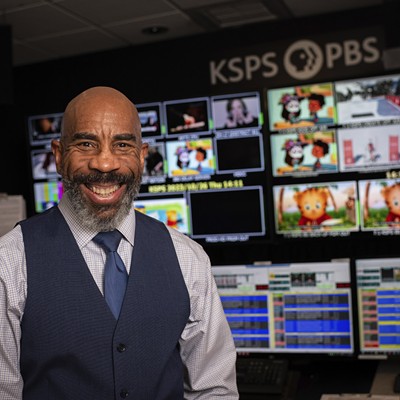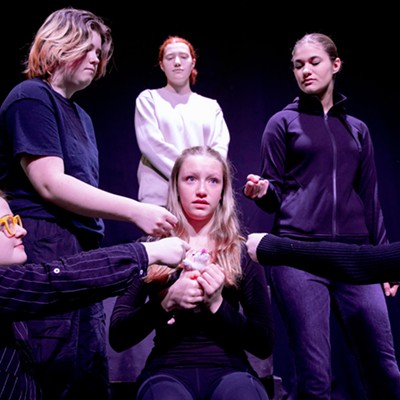When Lisa Gardner made her way back to Spokane in 2020, she didn't expect to be president of the local NAACP in just a few short years.
But that's exactly what happened.
When Gardner moved home, one of her friends promptly introduced her to Kiantha Duncan, who was the Spokane NAACP's president at the time. The two met for dinner at Duncan's house, and Duncan asked Gardner to join the NAACP.
"I was there for about two hours when she made the ask," Gardner says. "She knew my grandmother was an activist, too, so it was kind of this story of a prodigy child coming home."
After joining, Gardner moved her way up the ranks to become second vice president under Duncan. Duncan resigned in January 2023, and Gardner stayed as Kurtis Robinson shifted from vice president to begin his second stint as president of the local chapter of the nation's oldest civil rights organization.
In December, Robinson announced his resignation, and Gardner took a seat at the top of the organization she'd only joined a few years prior. And it's not even her day job. She still works as the Spokane City Council's communications and community engagement director.
We talked to Gardner about this recent change, what we can expect as new leadership takes over in City Hall, and who the up-and-coming Black leaders in Spokane are. This interview has been lightly edited for clarity and length.
INLANDER: Were you expecting to become the Spokane NAACP president?
GARDNER: Well, we weren't expecting Kiantha to resign, so it took me by surprise when she decided to leave. I didn't even expect to become the vice president after she left. I had a little time to actually prepare for the presidency: In the summer, Kurtis told us that he planned to step down. He had a lot going on with other commitments, and he'd served as the president previously.
What are you looking forward to in your new position?
I'm looking forward to the personal development that comes with being the NAACP president. It is such an honor to be a president in an organization that means this much, and I think it's going to catapult me forward to learn and absorb all the knowledge and really dive into what it means to be an activist and an advocate. Too many times people take a back seat, I want to push us forwards.
Why is the NAACP's work still important in Spokane?
We've been in Spokane since 1919, so we're truly entrenched in the tapestry of the city's existence. Black and Brown folks are such a small population in Spokane, so the NAACP works as our advocate when injustice is being done in the area.
We will be a voice for the voiceless. We will show our future leaders how to use their voice, how to use their activism. We do live in a world where the systems are broken, and a lot of them are shaped to not help Black and Brown communities. So we're making sure that Black and Brown folks live in an area where we all belong and that we're all safe and seen.
There was a big change in city leadership this year, with the elections of both Council President Betsy Wilkerson and Mayor Lisa Brown. How will that affect the way you lead the NAACP in Spokane?
I'm in the unique position that I am stepping into this position as the city is making transitions. Betsy Wilkerson just became the Spokane City Council president. She has been a champion in making sure underserved communities are heard.
Lisa Brown's campaign has always been an ally to the NAACP, so we're making sure that we have a relationship with the mayor's office. I look forward to her holding the city accountable and looking at areas where we can come together and not just brainstorm, but actually make change.
There needs to be a relationship between communities of color and public safety. I'm in a great place to make connections with a new police chief once they're chosen.
How do you plan to hold the city accountable when it's your employer? Is there a conflict there?
No, there's not necessarily a conflict as I would be working directly with the mayor, her team and the Spokane Office of Civil Rights. Working for the city isn't a hurdle but more so a collaboration, and I also plan to work with the Human Rights Commission — I'll be speaking at their March meeting.
Are there any cities that you're looking to as an example of what Spokane could become?
I wouldn't say we're trying to become like any other city. Lots of cities have different problems, and they require different solutions. For example, in Spokane we're working with communities to uplift Black history education — not just during Black History Month. It may be a silent fight, but it's such an important fight.
Times were different for our elders. Spokane had the second Black mayor in Washington, and there was this feeling of pride in Spokane that we were progressive. [James Chase was elected Spokane mayor in 1981 with more than 60% of the vote.] That was huge and really transformative for our community.
My hope is that what we do in Spokane can sometimes set the standards for what other cities are doing.
One thing I can say is that we're not going to be able to eradicate racism. It's just not something that the NAACP can do. It's something that we unfortunately need to break and chip away at those barriers.
But, what we are able to do in this time is lay the groundwork and lay down the path towards change. So those who come to follow know what has been done and what else can be done.
Who are some of the rising Black leaders in Spokane that we should look to?
We have a lot of youth who are overlooked, and they go unheard. And we have leaders that are emerging that will certainly lead us forward. The newness that's happening in Spokane is historic, and right now we're clearing the path for more Black and Brown people to more success. ♦
GARDNER'S YOUNG BLACK LEADERS OF SPOKANE
Stephaine Courtney is a young activist and educator. She's also the founder of the Learning Project Network — a multipurpose educational hub meant to advocate for underserved families throughout Eastern Washington.
Jaime Stacy is an educator and was the first Black woman to run for a spot on the Mead School Board. She also serves as the NAACP's first vice president and is the founder of Strong Women Achieving Greatness, a mentoring community that helps girls and young women reach success.
Jerrall Haynes became the first director of Spokane's Office of Civil Rights in June 2023. Before that, he was hired as the city's first civil rights coordinator in 2021. Haynes also served as a school board director, and eventually school board president, for Spokane Public Schools from 2015 to 2021.
Luc Jasmin III serves as the NAACP's second vice president and also works as Eastern Washington's regional outreach representative, working closely with Gov. Jay Inslee.
Chauncey Jones is the co-owner of A Better Way JJJ, a real estate investment company that rehabilitates single-family and multifamily homes in an effort to provide affordable housing in Spokane.
Kerra Bower is an early childhood advocate and founder of Raze Development Inc., a nonprofit organization that aims to dismantle barriers and challenges that Black students face in education. She's also the owner of Little Scholars Development Center.
























